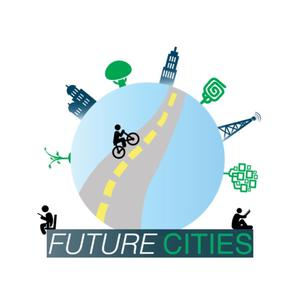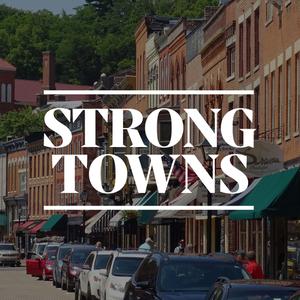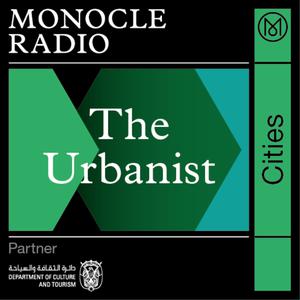
Future Cities
Future Cities
Future Cities is a monthly podcast that aims to increase awareness of, and to catalyze action on, urban resilience. The show examines this topic by discussing ongoing research, highlighting current efforts, and sharing stories of resilience in cities across the world. By exploring a wide variety of perspectives, the show digs deep into understanding the many dimensions of resilience and the ways in which cities prepare themselves for the extreme weather events of tomorrow. New episodes will be released at the start of every month. If you have questions about things we've discussed or have suggestions for future episodes, please e-mail us at [email protected] or send us a message on Twitter @FutureCitiesPod.
- 48 minutes 7 secondsImplementing Change: Progress on Climate Resilience in Atlanta, Georgia
This month, we're welcoming practitioners from Atlanta Regional Commission: Katherine Zitsch, Deputy COO, and Jon Philipsborn, Climate and Resilience Manager.
Regional commissions work on many subject areas across a metropolitan area, from community development and transportation to water security and climate change. At ARC, resilience is a key defining factor in how they make decisions around all of these topics and more. In this episode, hosts Alysha and Todd and their guests discuss how ARC is helping Atlanta tackle big development questions, challenges and opportunities.
The group also tackles larger questions like the role of government, specifically local governments, in engineering and environmental decisions, as well as specific projects ARC is working on to solve problems and build relationships across Atlanta.
"What's interesting about resilience is that everybody comes at it differently. Every city is in a different space, and every county is in a different space, and what we're trying to do at ARC is leverage the ones that are ahead towards helping the ones that are interested, but haven't had the space to get there yet."
Both guests also responded to our usual request for a haiku about their episode's subject matter, despite some debate about syllables...
Katherine's poem:
Atlanta's future
Knitting our resilience
Bridges to new paths
Jon's poem:
Disasters happen
Our choices influence the impact
Future is open
Learn more about Atlanta Regional Commission here.15 May 2024, 12:00 pm - 48 minutes 12 secondsExpect the Unexpected: Resilience and Life Advice from the Late Bronze Age
This month, anthropologist and historian Dr. Eric Cline and USACE research social scientist Dr. Ben Trump come together with hosts Alysha and Todd to explore large-scale regional destabilization and collapse in the Late Bronze Age.
Around 1200 B.C., an interconnected network of eight large, thriving civilizations collapsed in a matter of decades. Dr.s Cline and Trump wanted to explore how this collapse came about, whether the civilizations could have predicted or prevented it, and what resilience strategies some of these civilizations exhibited.
"They went down. There's no reason to suspect that we won't as well... It would be absolutely hubristic to think that we would be the first ones that are immune from that."
We promise it's not all that ominous. Listen to learn more about what these researchers describe as a "poly-crisis," and how we can learn from it today to be more resilient to environmental, economic and social disturbances, and how recovery from collapse takes place.
Dr. Eric Cline, Professor of Classical and Ancient Near Eastern Studies and of Anthropology; Director of the GWU Capitol Archaeological Institute: https://cnelc.columbian.gwu.edu/eric-h-cline
Dr. Ben Trump, Research Social Scientist, U.S. Army Corps of Engineers: https://www.linkedin.com/in/benjamin-trump-ba062523
Check out the paper: https://www.sciencedirect.com/science/article/pii/S0959378023001589/pdf
Check out Dr. Cline's book, 1177 B.C.: The Year Civilization Collapsed, here: https://press.princeton.edu/books/paperback/9780691208015/1177-bc
Preorder Dr. Cline's upcoming sequel, After 1177 B.C.: The Survival of Civilizations, here: https://press.princeton.edu/books/hardcover/9780691192130/after-1177-bc
You can also preorder the graphic novel version of 1177 B.C., coming soon: https://press.princeton.edu/books/paperback/9780691213026/1177-bc
Ben's Haiku:
Complexity's cost.
Dependency's brief fragility.
Resilience is key.
Eric's Haiku(s):
Bronze realms crumble,
empires fade in twilight's grasp,
ages mourn their fall.
Civilizations wane,
bronze echoes in silent ruins,
time's shadow devours.
Bronze echoes shatter,
civilizations entwine,
silent ruins weep.15 April 2024, 3:00 pm - 35 minutes 11 secondsSpecial Guest: Rachel Jacobson on Climate Resiliency in the Army and Beyond
This month features a special guest. The Honorable Rachel Jacobson, Assistant Secretary of the Army for Installations, Energy and Environment, visited UGA for the Southeast Defense Communities Resilience Workshop this week. During her busy visit to Athens, she stopped by to chat with Alysha and Todd about climate resilience in the U.S. Army: on military bases, in outreach projects and construction, and overseeing climate policies.
Ms. Jacobson is an experienced environmental lawyer who previously served in the Department of Justice and at private law firms in Washington, D.C. In this episode, she describes the importance of resilience in the military and its projects, and how (and why!) the Army is building a better standard of resilience.
Our guest described it best: "It is a national security imperative to maintain resilient installations."
Links:
Rachel Jacobson, Assistant Secretary of the Army for Installations, Energy and Environment: https://api.army.mil/e2/c/downloads/2022/04/21/3c9c5f77/hon-rachel-jacobson-s-bio.pdf
Helpful links from the ASA (IE&E), including projects and directories: https://www.army.mil/asaiee#org-ie-e-info-links
U.S. Army's Climate Strategy: https://www.army.mil/e2/downloads/rv7/about/2022_army_climate_strategy.pdf
U.S. Army's Climate Strategy Implementation Plan: https://www.army.mil/e2/downloads/rv7/about/2022_Army_Climate_Strategy_Implementation_Plan_FY23-FY27.pdf15 March 2024, 1:00 pm - 58 minutes 58 secondsEquitable Engineering: Nature-based Solutions in the Global South
Alysha and Todd speak with Marta Berbés-Blázquez and Stephanie Cruz Maysonet from the University of Waterloo about the implementation of Nature-based Solutions in the Global South. NbS research has primarily taken place in the Global North. The group discusses how to build solutions that satisfy the ecological, economic and sociopolitical needs of the Global South. Berbés-Blázquez introduces the idea of "urban labs," spaces for communities to engage in place-based experimentation. Cruz Maysonet then speaks to practitioners Tischa Muñoz Erickson (San Juan, Puerto Rico) and Mercy Borbor-Cordova (Guayaquil and Duran, Ecuador) about their work with communities and project management.
Stephanie's Haiku:
Stream-facing houses
Pounded by sudden waters
Now a blooming front.
Resources:Stephanie's participation was financially supported by the Waterloo Climate Institute. Learn more here: https://uwaterloo.ca/climate-institute/
15 February 2024, 2:00 pm - 43 minutes 3 secondsAn Interconnected World: Why Biodiversity Matters in Engineering
Alysha and Todd are joined by Kyle McKay (USACE Research Civil Engineer) and Charles van Rees (Conservation Scientist at UGA) to discuss BIODIVERSITY- and spoiler alert, it's a lot bigger than bugs and bunnies.
Biodiversity is an ecological concept that can be difficult to quantify but is critical for environmental stability. It's also something that engineers working on nature-based projects have to keep in mind for the creation and restoration of natural infrastructure systems.
Kyle's Haiku:
Built or natural?
Intergenerational
Legacy is key.
Charles's Haiku:
Safe homes and good health,
Butterfly, thistle, finch, fox.
Choose both: it's all life.
Todd's Haiku:
All species on Earth
Comprise the planet's machine
Pluck, pull, push, kaputResources:
Jointly advancing infrastructure and biodiversity conservation
The potential for nature-based solutions to combat the freshwater biodiversity crisis15 December 2023, 8:00 pm - 40 minutes 51 secondsPromoting Resilience: Interdisciplinary Expertise and Collaboration
On interdisciplinary collaboration, promoting resilience projects and disaster management strategies with Executive Director of ASCE, Tom Smith
Alysha Helmrich and Todd Bridges are joined by Tom Smith, Executive Director of the American Society of Civil Engineers, to discuss interdisciplinary collaboration between engineers, policy experts, and environmental managers. The group engages in a detailed discussion of how to promote resilience projects and disaster management strategies. Find the full episode description here.
Find links mentioned in the episode below!Pathways to Resilient Communities - Pathways to Resilient Communities (1).pdf (asce.org)
ASCE 73 Sustainable Infrastructure Standard - ASCE releases groundbreaking standard for sustainable infrastructure | ASCE
ASCE-NOAA Workshops and Report - New ASCE-NOAA report details tangible needs, progress toward climate-resilient infrastructure | ASCE
ASCE Future World Vision - Home | Future World Vision
ASCE INSPIRE Conference - Home | ASCE INSPIRE 2023
ASCE 7 Supplement - New addition to the ASCE/SEI 7-22 Standard protects buildings from a 500-year flood event | ASCE
ASCE Report Card - America's Infrastructure Report Card 2021 | GPA: C-
ASCE Code of Ethics - Code of Ethics | ASCE
G20 Policy Brief - T20_PolicyBrief_TF3_-Investments-Climate-Resilient-Infrastructure.pdf (orfonline.org)
Plot Points Podcast and new ASCE Book - The infrastructure system resilience big picture starts with incremental progress | ASCE
15 November 2023, 9:00 pm - 25 minutes 13 secondsTurning a new leaf: an introduction to the Resilient Futures Podcast
Join co-hosts Dr. Alysha Helmrich and Dr. Todd Bridges as they introduce themselves and the Institute for Resilient Infrastructure Systems, reintroduce the show, and try to define resilience! (Previously named the Future Cities podcast -- same content, new branding!)
1 October 2023, 7:00 am - 57 minutes 27 secondsThe Power of Identity: Bringing Our Whole Selves to Research
Academic research, no matter how scientific, can be deeply personal. Pursuing a PhD in a field like urban resilience demands an unwavering dedication to the topic driven by a genuine care for the issues at hand. While this passion can help motivate scholars, it is practically very difficult to bring one’s full self into academic endeavors, even when an institution explicitly recognizes that individuals’ unique perspectives and experiences can enrich their research and shed new light on complex problems. In this episode, Madison Horgan (PhD student, Arizona State University) interviews fellow ASU scholars Dr. Michele Clark and Taína Diaz-Reyes (PhD student) about how programs such as ASU’s Earth Systems Science for the Anthropocene Graduate Scholars Network (ESSA) can help create safe spaces for researchers, especially black, Indigenous, and people of color, who have unique and incredibly important perspectives on resilience and science, to bring their whole selves to their research.
Cultivating safe spaces for reflection and learning is especially important when working on place-based solutions alongside communities. Recognizing that urban resilience is not a one-size-fits-all concept, some scholars will partner with local communities to develop contextually relevant strategies. Solutions that are tailored to the specific challenges, needs, and aspirations of a particular community hold the potential for more meaningful and sustainable impact. However, to do this work well, researchers must learn how to ask the right questions to understand the nuances of each context and identify the most pressing issues that need to be addressed. Asking the right questions involves engaging with community members, stakeholders, and experts to gain a comprehensive understanding of the interconnected factors that contribute to urban resilience. Further, we discuss what it means to use the term “solutions” in the context of wicked challenges.
Follow our guests on Twitter!
@ESSA_ASU, @ MicheleDClark1, and @Tai_rannosaurus
---
If you have questions, comments, or suggestions for future episodes, e-mail us at [email protected] or find us on Twitter @FutureCitiesPod. Learn more about the NATURA project at natura-net.org.1 September 2023, 9:00 am - 46 minutes 57 secondsGreen Infrastructure: Opportunities, Challenges, and the CUGIC
Urban green infrastructure has the ability to make cities more sustainable. However, the exact implementation of green infrastructure and the choices that must be made during implementation are still topics for discussion. Recently, the Consolidated Urban Green Infrastructure Classification (CUGIC) was published as a tool to help policymakers, practitioners and researchers assess the state of their urban green infrastructure relevant to urban biodiversity, human well-being, and ecosystem services. In this podcast, Joeri Morpurgo (Leiden University), Dirk Voets (Head remote sensing, Cobra-Groeninzicht), Ciska van Alphen (Policy officer, Ministry of Agriculture, Nature and Food Quality), and Jacco Schuurkamp (Senior policy officer, Municipality The Hague) discuss the challenges and opportunities for implementing green infrastructure and how CUGIC helps!
Follow our guests on Twitter!
@DirkVoets, @JoeriMorpurgo @UniLeidenNews and @MultiGreen3.
---
If you have questions, comments, or suggestions for future episodes, e-mail us at [email protected] or find us on Twitter @FutureCitiesPod. Learn more about the NATURA project at natura-net.org.1 August 2023, 9:00 am - 31 minutes 4 secondsFuture of Urban Hydrology
On this month's episode of the Future Cities Podcast, Dr. Alysha Helmrich hosts Dr. Virginia Smith, who explores the future of urban hydrology. She covers a lot of ground! From the magnitude of flood impacts, the differences between hydrology and urban hydrology, the stakeholders in urban flooding, data collection and management for stormwater, integration of AI in stormwater management, and social vulnerability and equity. Tune in to hear all the details!
Of note, Virginia is hiring students! You can reach out directly via email or apply online at: https://www1.villanova.edu/university/engineering/faculty-research/Resilient-Water-Systems.html
Relevant Links to Research Articles:https://link.springer.com/content/pdf/10.1038/s41598-020-65232-5.pdf
https://onlinelibrary.wiley.com/doi/abs/10.1111/1752-1688.12656
https://ascelibrary.org/doi/full/10.1061/JSWBAY.0000945
https://ascelibrary.org/doi/full/10.1061/JSWBAY.0000958
https://ascelibrary.org/doi/abs/10.1061/JSWBAY.0000986
https://www.nature.com/articles/s41598-022-23214-9
Follow our guest on Twitter!
@VCRWSteam
---
If you have questions, comments, or suggestions for future episodes, e-mail us at [email protected] or find us on Twitter @FutureCitiesPod. Learn more about the NATURA project at natura-net.org.1 July 2023, 9:00 am - 42 minutesCan I Recycle This?
On this month's episode of the Future Cities podcast, Alysha Helmrich interviews her colleague, Katherine (Kat) Shayne. Kat Shayne is the CEO of Can I Recycle This? (CIRT). A start-up homed in Athens, GA that helps cities, counties, businesses, and individuals properly dispose of products. Kat shares her own journey in sustainability that led her to creating CIRT and describes CIRT's mission and goals. You can learn more about CIRT at www.cirt.tech. You can also learn more about the Circularity Informatics Lab at https://www.circularityinformatics.org/.
Follow our guest on Twitter!
@CanIRecycleThis
@KatherineShayne
---
If you have questions, comments, or suggestions for future episodes, e-mail us at [email protected] or find us on Twitter @FutureCitiesPod. Learn more about the NATURA project at natura-net.org.1 June 2023, 12:00 pm - More Episodes? Get the App
Your feedback is valuable to us. Should you encounter any bugs, glitches, lack of functionality or other problems, please email us on [email protected] or join Moon.FM Telegram Group where you can talk directly to the dev team who are happy to answer any queries.
 Green Dreamer: Seeding change towards collective healing, sustainability, regeneration
Green Dreamer: Seeding change towards collective healing, sustainability, regeneration
 The War on Cars
The War on Cars
 The Ezra Klein Show
The Ezra Klein Show
 American Planning Association
American Planning Association
 The Strong Towns Podcast
The Strong Towns Podcast
 The Urbanist
The Urbanist